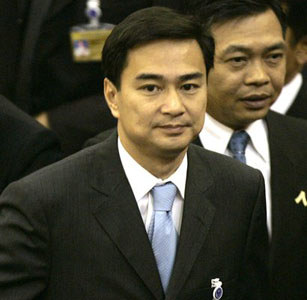Thai prime minister visits troubled south to review emergency laws
 Bangkok - Thai Prime Minister Abhisit Vejjajiva flew to the country's troubled deep south Saturday for his first official time, days after saying he would review controversial emergency laws permitting extended detention without trial.
Bangkok - Thai Prime Minister Abhisit Vejjajiva flew to the country's troubled deep south Saturday for his first official time, days after saying he would review controversial emergency laws permitting extended detention without trial.
Abhisit had earlier shrugged off concerns about his safety visiting three provinces where some 3,500 people have died in the five years since a long-running Muslim separatist conflict became much more intense.
His Democrat Party controls most of Thailand's entire southern panhandle, including the majority Muslim Pattani, Yala and Narathiwat provinces where separatist guerilla attacks are now a daily occurrence. Bangkok pundits have suggested the new government might be able bring the level of violence down to the low levels that existed in the late 1990s when the Democrats were last in power.
The prime minister admitted this week that the bloody insurgence is a major headache for his new government. The war has been almost entirely confined to the deep south, but might yet spread north with alarming political and economic consequences, observers say.
Abhisit, accompanied by ministers responsible for development in the south and Defence Minister Prawit Wongsuwan, is to be briefed by officials and visit a "task force for peace" and an experimental farm.
Abhisit told foreign reporters on Wednesday he would review emergency laws in operation since October 2005 that allow the security authorities to hold suspects without charge and give immunity to security personnel carrying out "hard" policing. The law must be approved by Parliament every three months.
Human rights groups have criticized the laws as permitting brutal security operations that ultimately exacerbate a nasty civil war. Amnesty International last week accused previous Thai governments of turning a blind eye to routine torture.
With nearly 45 per cent of Thailand's armed forces based in the three provinces there is a perception that the military have added to the problem, especially as they enjoy immunity under the emergency decree.
Although the region was conquered by Bangkok about 200 years ago, it has never wholly submitted to Thai rule. The Oxford-educated Abhisit, who was named prime minister last month, has vowed to bring reconciliation to Thailand, which has been torn by a deep political divide for the past three years, through an emphasis on rule of law.
"My basic assumption is that you will never have reconciliation unless there is justice," Abhisit said last week. "The same principle applies to the South." (dpa)
